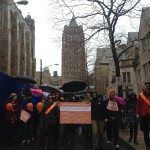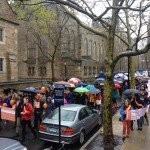Last updated Wednesday, April 30 at 8:45 p.m.
Chanting “Our work makes Yale work,” and “Union power in the ivory tower,” hundreds of graduate students protested on Beinecke Plaza Wednesday in favor of a graduate student union.
The protest was organized by the Graduate Employees and Students Organization, or GESO, a graduate student union not recognized by Yale. It began at the Hall of Graduate Studies and proceeded down Wall Street to Woodbridge Hall, where the office of University President Peter Salovey is located. With the shutters closed and several police officers guarding the entrance to the building, GESO leaders delivered a petition, bearing the signatures of over 1,000 graduate students, calling on the administration to work with GESO to develop a process for an election on graduate student unionization.
“We may hear the University try to claim that the people gathered here today aren’t workers,” GESO Chair Aaron Greenberg GRD ’18 said on the steps of Woodbridge Hall. “If the University trusts us to teach, they should trust us to negotiate over the conditions of our work.”
Salovey did not respond to request for comment yesterday.
Much of the debate over unionization centers around the question of whether graduate students are employees of the University. While Yale maintains that they are not, the petition delivered referred to them as “graduate employees,” and protesters Wednesday did the same.
In addition to the election, the petition also calls for increased fairness and transparency in graduate employment, expansion of Yale’s academic workforce — particularly tenure-track faculty positions — commensurate with the 15 percent growth in the size of Yale College and increased equity in the University.
In the final demand, the petition specified that Yale ought to provide more resources for underrepresented minorities, improve support for parents, hire more women and people of color and take strides to create academic workplaces free of sexual harassment and discrimination.
“We have to make sure that those who do the research and the teaching get to have a say in how the research and teaching gets done,” said Antoine Lentacker GRD ’14, a doctoral student in the history department.
Saby Das GRD ’15, who is in the economics department, said that there is wide demand for unionization among the graduate student body.
The petition first started circulating in late March, Greenberg said. In addition to delivering a large copy to Salovey’s office, the protesters also delivered the petition to the office of Graduate School Dean Thomas Pollard.
Greenberg said he anticipates the petition will shift the thinking of the administration, which thus far has strongly resisted unionization. He added that he sees Salovey becoming University president last year as an opportunity to move the GESO agenda forward.
“It’s a new leaf and we’re looking forward to working with him,” Greenberg said.
GESO’s push for recognition comes with the backing of Yale’s two established unions, Local 34 and Local 35, which include the University’s white and blue-collar staff, respectively. GESO, Local 34 and Local 35 are all part of the Unite Here group of unions.
On Wednesday, the protesters were greeted outside of Woodbridge Hall by a large contingent of Local 34 and Local 35 employees and leaders, including Local 35 President Bob Proto.
Protesters chanted “Local 34, Local 35, GESO” as they marched down Wall Street.
“You shouldn’t have to explain that what you do is work. They know it’s work and they try to avoid it,” Maureen Jones, a vice president and founder of Local 34 of the Yale administration, told the crowd outside Woodbridge Hall. “You should be able to negotiate your terms with them like anyone else who does work.”
Greenberg said that the recent push at Yale has been catalyzed by movements toward unionization elsewhere.
Last December, graduate students at New York University (NYU) voted overwhelmingly to form a union after that university’s administration said it would recognize the results of an election. Earlier this month, graduate students at the University of Connecticut also voted to unionize.
Wednesday’s protest also comes on the heels of a recent ruling by the National Labor Relations Board (NLRB) that football players at Northwestern University were employees of the school and that, as a result, they could vote to form a union.
“The time is right now in terms of NYU, the time is right now in terms of the University of Connecticut. The time is also right now in terms of Northwestern University,” Greenberg said.
In addition to speeches from Greenberg and other GESO and Local 34 leaders, a member of the NYU union spoke to the crowd.
In 2003, graduates students voted narrowly against forming a union.










